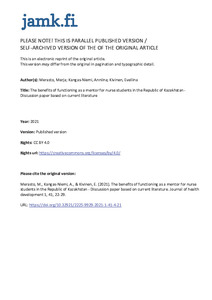The benefits of functioning as a mentor for nurse students in the Republic of Kazakhstan - Discussion paper based on current literature
Merasto, Merja; Kangas-Niemi, Anniina; Kivinen, Eveliina (2021)
Merasto, Merja
Kangas-Niemi, Anniina
Kivinen, Eveliina
Republican Center for Health Development
2021
Julkaisun pysyvä osoite on
https://urn.fi/URN:NBN:fi-fe2022030221467
https://urn.fi/URN:NBN:fi-fe2022030221467
Tiivistelmä
The aim of the study: The aim of this discussion paper is to identify and provide an overview of the benefits of mentorship for the mentor of nurse students and describe the facilitators and barriers the nurse mentors encounter in their mentorship activities during nurse students' clinical practice.
Methods: The databases CINAHL, Medline, Pub Med and Science Direct from 2016-2021 were searched. The studies were screened by title, abstract and full text. 25 studies met the inclusion criteria.
Results: Eight key themes emerged from the included studies. These theme areas were as follows; 1) being a role model, 2) recognition of role value and esteem, 3) keeping up to date, 4) student attributes, 5) colleague attributes, 6) time challenges, 7) location challenges and 8) lack of financial remuneration. The findings revealed nurse mentors experiencing knowledge transfer and facilitating students’ learning as major benefits of mentoring. Being a role model was reported in many of the selected articles. The mentoring role promoted the overall clinical quality, patient safety, and additionally made nurse mentors feel valued. Overall “lack of time” was referred several times as a barrier and frustrating element in the mentor’s work.
Conclusions: Mentors have an important role and should be acknowledged as one of the cornerstones of quality nursing education. The findings highlight the significant benefits of mentoring from the mentor’s perspective. In the Republic of Kazakhstan, the goal is to develop the mentoring of nurse students and to train more competent mentors in the coming years. It is important to point out that mentoring has multiple benefits for the mentor, the student, the work community, and the health care organization as well as for nursing education. Research in these areas is important when developing mentoring nationwide.
Methods: The databases CINAHL, Medline, Pub Med and Science Direct from 2016-2021 were searched. The studies were screened by title, abstract and full text. 25 studies met the inclusion criteria.
Results: Eight key themes emerged from the included studies. These theme areas were as follows; 1) being a role model, 2) recognition of role value and esteem, 3) keeping up to date, 4) student attributes, 5) colleague attributes, 6) time challenges, 7) location challenges and 8) lack of financial remuneration. The findings revealed nurse mentors experiencing knowledge transfer and facilitating students’ learning as major benefits of mentoring. Being a role model was reported in many of the selected articles. The mentoring role promoted the overall clinical quality, patient safety, and additionally made nurse mentors feel valued. Overall “lack of time” was referred several times as a barrier and frustrating element in the mentor’s work.
Conclusions: Mentors have an important role and should be acknowledged as one of the cornerstones of quality nursing education. The findings highlight the significant benefits of mentoring from the mentor’s perspective. In the Republic of Kazakhstan, the goal is to develop the mentoring of nurse students and to train more competent mentors in the coming years. It is important to point out that mentoring has multiple benefits for the mentor, the student, the work community, and the health care organization as well as for nursing education. Research in these areas is important when developing mentoring nationwide.
